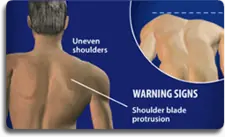Adult Degenerative Scoliosis
Scoliosis is a curvature of the spine. Many people think it only occurs in children, but adults can have scoliosis as well. Adult scoliosis is defined as an abnormal curvature of the spine in someone over the age of 18. Sometimes, this is the result of a childhood curvature that was left untreated but has since progressed. Other times, scoliosis can develop as a result of age and normal “wear and tear” on the spine.
Symptoms
As we get older, many changes occur to our bodies – this is especially true in the spine. As parts of the spine deteriorate, many people begin to experience back or neck pain. This can lead to a number of common degenerative spinal conditions, such as:
- Spinal stenosis
- Degenerative disc disease
- Vertebral compression fractures
- Kyphosis
- Sagital imbalance
Any of these conditions can cause the spine to curve to the left or the right, or cause a person to “hunch forward.” Curvature can also cause other problems such as:
- Trunk imbalance (making the patient appear as though they’re leaning to one side)
- Spinal instability
- Rib prominence
- Humpback
- Pain
- Nerve compression causing weakness in the legs or feet
- Heart and lung problems (only in severe cases)
Diagnosis
The first step in treating adult degenerative scoliosis, is making an accurate diagnosis. This involves getting a detailed history of your symptoms, past treatments including surgeries, and performing a thorough exam. Additionally, a number of special X-rays are ordered as well as an MRI and/or CT scan.
Treatment
Most cases of adult degenerative scoliosis are treated non-surgically. Some treatment options include:
- Physical therapy
- Pain and anti-inflamatory medications
- Steroid injections
Surgical correction of adult degenerative scoliosis is not common. However, it may be necessary if non-operative treatments fail, and pain persists. If surgery is necessary, it usually includes a fusion of some of the vertebrae using spinal instrumentation (commonly rods and screws) to stabilize the spine. Keep in mind, many cases of adult degenerative scoliosis need no treatment at all. Unfortunately, there is nothing that will guarantee that an adult degenerative scoliosis won’t progress and ultimately need surgery, but the best thing patients can do is maintain a healthy lifestyle, exercise regularly, eat a balanced diet, and avoid nicotine. These good habits can help prevent many spine problems from getting worse, and causing more symptoms.



